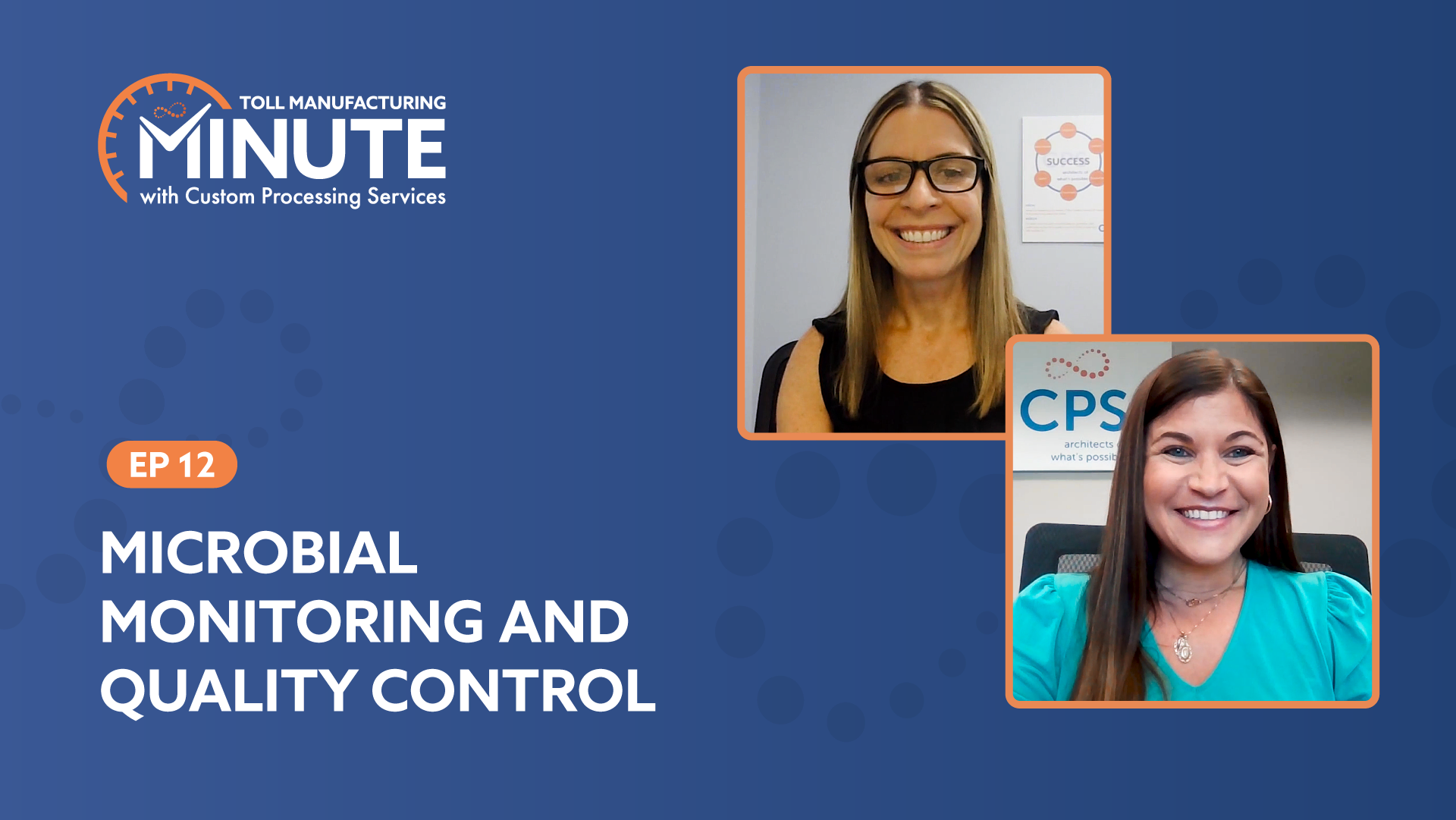Toll Manufacturing Minute with CPS: Microbial Monitoring & Quality Assurance

From food-grade powders and pharmaceuticals to environmentally-friendly cleaning solutions and technical polymers, preventing microbial contamination is both complex and critical. Manufacturers entrust suppliers with strict oversight and testing protocols to protect product safety, stability, and shelf life
In this episode of Toll Manufacturing Minute, CPS Director of Quality Jen Smith offers an inside look at how Custom Processing Services safeguards powdered materials from microbial threats.
Below, we’ve captured key details from the conversation about how CPS combines science, strict protocols, and in-house analytical lab expertise to support product safety, shelf stability, regulatory compliance, and more:
What Is Microbial Monitoring, and Why Does It Matter?
Microbial monitoring is the process of assessing and controlling the presence of microorganisms during manufacturing.
Due to their surface area and tendency to retain moisture, powder products are highly susceptible to microbial growth. This makes microbial monitoring especially critical in high-stakes industries, including:
- Food and beverage: contamination can pose serious health risks
- Pharmaceuticals: micro-level deviations affect drug efficacy and shelf life
- Medical devices: hygienic cleanliness is essential for patient safety and regulatory compliance
- Eco-conscious cleaners, coatings, and polymers: microbial activity can degrade formulation performance
Without the safeguards of microbial monitoring, contamination could lead to complications, costly rework, product recalls, and potential damage to brand reputation.
Integrated Quality Systems v. Fragmented Efforts
At CPS, microbial monitoring isn’t a bolt-on service. It’s a foundational part of our fully integrated quality management and food safety systems that are certified to the globally recognized standards of ISO 9001:2015 and FSSC 22000.
Since these programs are engineered to work together, microbial controls are built into every phase of production, from raw material handling through final product testing.
This integrated CPS approach ensures:
- Less risk of blind spots or missed variables because all factors are accounted for, every step of the way
- Faster identification and resolution of issues so product quality remains consistent, meets spec, and satisfies customers
- Streamlined operations that reduce duplication and confusion between departments or suppliers
- Audit-ready documentation reflecting both process discipline and technical accuracy
In addition to ISO and FSSC credentials, CPS has certifications from Gluten-Free Certification Organization (GFCO), Pennsylvania Certified Organic (PCO), and Halal & Kosher.
In-House Testing: Faster Answers, Greater Confidence
Our newly expanded analytical lab is a much-appreciated competitive advantage.
“CPS lab capabilities are a secret weapon,” Jen explained. “Not every toll processor offers this level of internal support.”
From active and passive air sampling to surface swabs and ATP bioluminescence, our team uses the right tool for the right job — and aligns our methods to each product’s unique risk profile.
Benefits include:
- Real-time data for batch release decisions: On-site microbial testing supports positive release protocols by delivering timely, spec-confirmed results without third-party delays
- Informed investigations and rapid root cause analysis: Integrated lab access allows CPS to quickly isolate issues using custom methodologies and advanced instrumentation
- Immediate, on-site adjustments that minimize disruption: Quality and food safety systems are closely linked to lab outputs, enabling fast, corrective actions that keep production on schedule
Looking Ahead: Trends in Microbial Monitoring
As technology and regulations evolve, so do the expectations for how manufacturers manage microbial risk
As part of our annual revalidation and continuous improvement initiatives, CPS regularly reviews and updates all microbial monitoring and sanitation programs. By staying current with industry guidance we ensure our processes remain compliant, effective, and aligned with customer expectations.
Looking to the future, Jen and the CPS lab team are seeing two trends taking shape:
- Faster, more sensitive detection methods
The ability to detect microbial contamination quickly and at lower thresholds is becoming a top priority for many manufacturers. CPS actively evaluates and adopts rapid methods for microbial detection to shorten turnaround times, enable faster decision-making, and support time-sensitive batch release protocols. - Environmentally safer cleaning and disinfecting techniques
As customers and regulatory bodies demand more sustainable products and practices, CPS is exploring greener, less harsh sanitation methods that still meet rigorous quality and hygiene standards. These solutions aim to balance efficacy with environmental responsibility, especially important in facilities that handle sensitive materials for food, pharma, and other industries.
At CPS, the connection between our analytical lab and quality systems is a strategy that underpins the promises we make to our customers. By housing advanced testing capabilities within a framework of ISO- and FSSC-certified programs, we deliver more than compliance: we deliver confidence.


.png?width=100&height=110&name=CPS-Logo-rgb-no-callout%20(1).png)